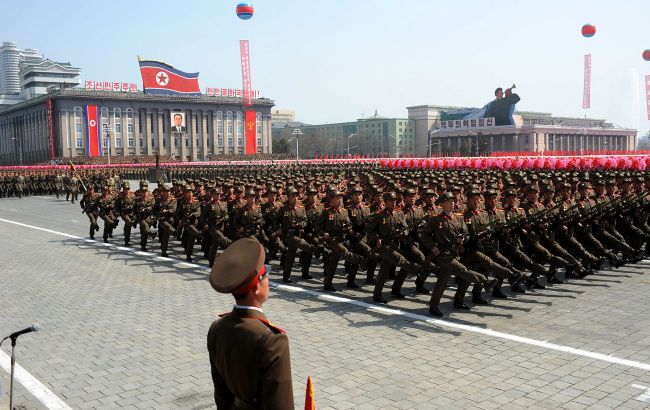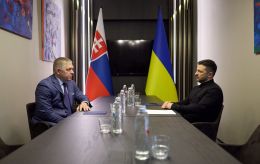Putin turns to North Korea deal to avoid new mobilization in Russia – ISW
 Photo: Putin wants to replace Russians with DPRK soldiers to avoid mobilization (Getty Images)
Photo: Putin wants to replace Russians with DPRK soldiers to avoid mobilization (Getty Images)
The Kremlin is leveraging a recent comprehensive strategic partnership agreement with North Korea to delay further waves of mobilization in Russia for as long as possible, according to the Institute for the Study of War (ISW).
The Institute noted that it could not confirm reports about the creation of a battalion of 3,000 North Korean citizens to conduct Russian military operations in the Kursk region nor the desertion of a group of North Korean soldiers.
Instead, the report recalled that on October 14, Russian President Vladimir Putin submitted the text of the treaty on the comprehensive strategic partnership between Russia and North Korea, signed in June 2024, for ratification in the Russian State Duma.
It was noted that Kremlin spokesperson Dmitry Peskov emphasized in a comment to TASS that the treaty between Russia and North Korea is unequivocal regarding "mutual defense and security cooperation."
"The Kremlin is likely using the 'mutual defense' provision of the agreement to provide the legal justification for the deployment of North Korean soldiers to the combat zone in Russia in response to the Ukrainian incursion into the Kursk region. ISW has recently observed reports that a small contingent of North Korean personnel was operating near occupied Donetsk City," the ISW states.
Replacement of full mobilization
However, according to the ISW, beyond the legal justification, the Kremlin’s willingness to reach a mutual defense agreement with North Korea indicates that Putin continues to rely on alternative means of strengthening the military rather than announcing partial or total mobilization.
The Institute for the Study of War pointed out that the Russian president continues to rely on crypto-mobilization and the formation of new volunteer units to avoid the internal consequences of total mobilization in society or another wave of partial mobilization.
The ISW believes that this dilemma became especially acute for Putin after Ukraine's incursion into the Kursk region in August 2024, when Russian forces had to address new personnel needs driven by the necessity to defend an entirely new front inside Russia itself.
Nevertheless, the report continues, the Russian president's response to the invasion of the Kursk region aligns with his overall approach to shaping Russia's armed forces throughout the war. He thus maintained his reluctance to confront the invasion more seriously by initiating broader mobilization.
Instead, according to the ISW, Putin focused on the unique creation of new territorial defense units, the redeployment of existing units from Ukraine, and the use of conscripts.
"The use of North Korean personnel under the mutual defense clause of the Russia-North Korea agreement is part of the same wider effort. Putin appears more willing to absorb North Korean personnel into the Russian military and resort to other irregular force generation efforts than to call for a wider mobilization to actually address the combat situation in the theater of operations," the ISW report states.
Russia-North Korea cooperation
In June, Russian President Vladimir Putin paid an official visit to Pyongyang.
During the visit, Putin and North Korean leader Kim Jong Un signed a strategic partnership agreement. The document provides, among other things, for mutual assistance in the event of aggression against either country.
Recently, media reports indicated that thousands of North Korean soldiers are being trained on Russian territory for eventual deployment to the Ukrainian front by the end of 2024.
In early October, six North Korean army officers were killed by a missile strike from the Ukrainian Armed Forces near occupied Donetsk.
Meanwhile, the Armed Forces of Ukraine reported the formation of a special battalion in the 11th Guards Air Assault Brigade of the Russian Armed Forces, with North Korean military personnel participating. The battalion is planned for use in the Kursk region.
According to Ukrainian intelligence, 18 North Korean soldiers had already deserted their positions in the Bryansk and Kursk regions before this unit was deployed in combat operations.

